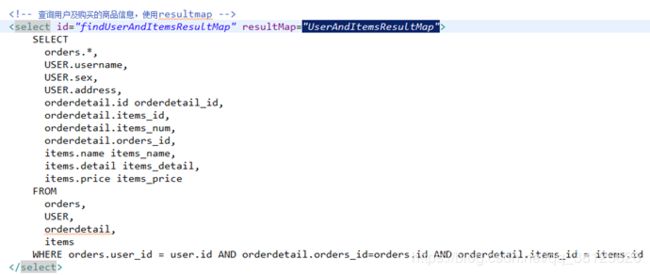mybatis(10)高级映射多对多查询
目录
多对多查询总结
resultmap总结
需求
查询用户机器购买商品的信息
sql语句
查询主表是:用户表
关联表:由于用户和商品没有直接关联,通过订单和订单明细进行关联,所以关联表:orders、orderdetail、items
SELECT
orders.*,
USER.username,
USER.sex,
USER.address,
orderdetail.id orderdetail_id,
orderdetail.items_id,
orderdetail.items_num,
orderdetail.orders_id,
items.name items_name,
items.detail items_detail,
items.price items_price
FROM
orders,
USER,
orderdetail,
items
WHERE orders.user_id = user.id AND orderdetail.orders_id=orders.id AND orderdetail.items_id = items.id
映射思路
将用户信息映射到user中。
在user类中添加订单列表属性List
在Orders中添加订单明细列表属性List
在OrderDetail中添加Items属性,将订单明细所对应的商品映射到Items
mapper.xml
resultmap
<resultMap type="cn.itcast.mybatis.po.User" id="UserAndItemsResultMap">
<id column="user_id" property="id"/>
<result column="username" property="username"/>
<result column="sex" property="sex"/>
<result column="address" property="address"/>
<collection property="ordersList" ofType="cn.itcast.mybatis.po.Orders">
<id column="id" property="id"/>
<result column="user_id" property="userId"/>
<result column="number" property="number"/>
<result column="createtime" property="createtime"/>
<result column="note" property="note"/>
<collection property="orderdetails" ofType="cn.itcast.mybatis.po.Orderdetail">
<id column="orderdetail_id" property="id"/>
<result column="items_id" property="itemsId"/>
<result column="items_num" property="itemsNum"/>
<result column="orders_id" property="ordersId"/>
<association property="items" javaType="cn.itcast.mybatis.po.Items">
<id column="items_id" property="id"/>
<result column="items_name" property="name"/>
<result column="items_detail" property="detail"/>
<result column="items_price" property="price"/>
association>
collection>
collection>
resultMap>
mapper.java
多对多查询总结
将查询用户购买的商品信息明细清单,(用户名、用户地址、购买商品名称、购买商品时间、购买商品数量)
针对上边的需求就使用resultType将查询到的记录映射到一个扩展的pojo中,很简单实现明细清单的功能。
一对多是多对多的特例,如下需求:
查询用户购买的商品信息,用户和商品的关系是多对多关系。
需求1:
查询字段:用户账号、用户名称、用户性别、商品名称、商品价格(最常见)
企业开发中常见明细列表,用户购买商品明细列表,
使用resultType将上边查询列映射到pojo输出。
需求2:
查询字段:用户账号、用户名称、购买商品数量、商品明细(鼠标移上显示明细)
使用resultMap将用户购买的商品明细列表映射到user对象中。
总结:
使用resultMap是针对那些对查询结果映射有特殊要求的功能,,比如特殊要求映射成list中包括 多个list。
resultmap总结
resultType:
作用:
将查询结果按照sql列名pojo属性名一致性映射到pojo中。
场合:
常见一些明细记录的展示,比如用户购买商品明细,将关联查询信息全部展示在页面时,此时可直接使用resultType将每一条记录映射到pojo中,在前端页面遍历list(list中是pojo)即可。
resultMap:
使用association和collection完成一对一和一对多高级映射(对结果有特殊的映射要求)。
association:
作用:
将关联查询信息映射到一个pojo对象中。
场合:
为了方便查询关联信息可以使用association将关联订单信息映射为用户对象的pojo属性中,比如:查询订单及关联用户信息。
使用resultType无法将查询结果映射到pojo对象的pojo属性中,根据对结果集查询遍历的需要选择使用resultType还是resultMap。
collection:
作用:
将关联查询信息映射到一个list集合中。
场合:
为了方便查询遍历关联信息可以使用collection将关联信息映射到list集合中,比如:查询用户权限范围模块及模块下的菜单,可使用collection将模块映射到模块list中,将菜单列表映射到模块对象的菜单list属性中,这样的作的目的也是方便对查询结果集进行遍历查询。
如果使用resultType无法将查询结果映射到list集合中。
